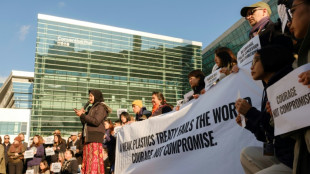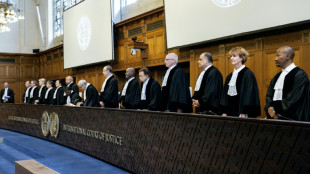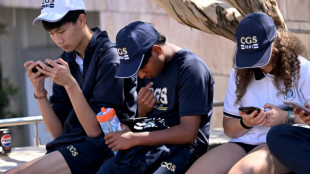
-
 British MPs debate contentious assisted dying law
British MPs debate contentious assisted dying law
-
Macron offers first glimpse of post-fire Notre Dame

-
 Syria jihadists, allies shell Aleppo in shock offensive
Syria jihadists, allies shell Aleppo in shock offensive
-
Japan government approves $92 bn extra budget

-
 Toll in Syria jihadist-army fighting rises to 242: monitor
Toll in Syria jihadist-army fighting rises to 242: monitor
-
UK transport secretary quits in setback for Starmer

-
 Days before deadline, plastic treaty draft highlights disagreement
Days before deadline, plastic treaty draft highlights disagreement
-
Crypto boss eats banana art he bought for $6.2 million

-
 Teen news boss criticises Australian social media ban
Teen news boss criticises Australian social media ban
-
Taiwan detects 41 Chinese military aircraft, ships ahead of Lai US stopover

-
 Spain urged to 'build differently' after deadly floods
Spain urged to 'build differently' after deadly floods
-
WTO chief faces heavy task as Trump threat looms

-
 Herbert takes control at Australian Open as Smith tanks
Herbert takes control at Australian Open as Smith tanks
-
Israel PM again warns Iran after top diplomat talks of revising nuclear doctrine

-
 Brilliant Brook's 132 puts England on top against sloppy New Zealand
Brilliant Brook's 132 puts England on top against sloppy New Zealand
-
Brilliant Brook's 132 puts England on top against New Zealand

-
 US landmine offer to Ukraine throws global treaty into 'crisis': campaign group
US landmine offer to Ukraine throws global treaty into 'crisis': campaign group
-
Singapore hangs 4th person in three weeks

-
 Five things to know about NewJeans' shock split from agency
Five things to know about NewJeans' shock split from agency
-
Waste pickers battle for recognition at plastic treaty talks

-
 Ireland votes in closely fought general election
Ireland votes in closely fought general election
-
Top UN court to open unprecedented climate hearings

-
 European countries that allow assisted dying
European countries that allow assisted dying
-
British MPs to debate contentious assisted dying law

-
 Schmidt not expecting hero's welcome on Ireland return
Schmidt not expecting hero's welcome on Ireland return
-
PSG stuck between domestic dominance and Champions League woes

-
 'Hot fight' as unbeaten Bayern visit Dortmund fortress
'Hot fight' as unbeaten Bayern visit Dortmund fortress
-
Bordeaux-Begles' Samu 'not finished yet' with Wallabies

-
 Brook and Pope half-centuries haul England to 174-4 against NZ
Brook and Pope half-centuries haul England to 174-4 against NZ
-
Yen rallies on rate hike bets as equity markets swing

-
 Ukraine superstar Mahuchikh brings 'good vibes' to her war-torn country
Ukraine superstar Mahuchikh brings 'good vibes' to her war-torn country
-
PlayStation at 30: How Sony's grey box conquered gaming

-
 Saudi Arabia hosts UN talks on drought, desertification
Saudi Arabia hosts UN talks on drought, desertification
-
PlayStation: Fun facts to know as Sony's console turns 30

-
 Nepal's first transgender candidates run for local office
Nepal's first transgender candidates run for local office
-
Father of PlayStation says 'everyone told us we would fail'

-
 Ireland seek to overcome former coach Schmidt's Wallabies
Ireland seek to overcome former coach Schmidt's Wallabies
-
Detroit survive Bears comeback to make it 10 wins in a row

-
 Mexican actor Silvia Pinal dead at 93
Mexican actor Silvia Pinal dead at 93
-
'Black Friday' deals target inflation-weary US consumers

-
 Liverpool look to deepen Man City crisis, Amorim seeks first Premier League win
Liverpool look to deepen Man City crisis, Amorim seeks first Premier League win
-
Police fire rubber bullets, tear gas at Georgia protesters after PM delays EU bid

-
 England lose three quick wickets in reply to New Zealand's 348
England lose three quick wickets in reply to New Zealand's 348
-
Social media companies slam Australia's under-16 ban

-
 Police fire tear gas at Georgia protesters after PM delays EU bid
Police fire tear gas at Georgia protesters after PM delays EU bid
-
Canada watchdog sues Google over 'anti-competitive' ad tech

-
 Hojlund gives Amorim winning Old Trafford bow, Roma hold Spurs
Hojlund gives Amorim winning Old Trafford bow, Roma hold Spurs
-
Amorim wins first Man Utd home game after rollercoaster ride

-
 France arrests 26 as South Asian migrant trafficking ring smashed
France arrests 26 as South Asian migrant trafficking ring smashed
-
At least 15 dead, 113 missing, in Uganda landslides


N Korea sending 'large-scale' troop deployment to Russia, Seoul spy agency says
North Korea has decided to send a "large-scale" troop deployment to support Moscow's war in Ukraine, with 1,500 special forces already in Russia's Far East and undergoing training, Seoul's spy agency said Friday.
The National Intelligence Service said the North had decided to send thousands of soldiers to help Russia, releasing detailed satellite images it said showed the first deployment.
South Korea's President Yoon Suk Yeol convened an emergency security meeting Friday, with Seoul slamming Pyongyang's move as "a significant security threat not only to our country but also to the international community," the president's office said.
The NIS said it had "detected that from the 8th to the 13th (of October), North Korea transported its special forces to Russia via a Russian Navy transport ship, confirming the start of North Korea's military participation" in Russia's war in Ukraine.
According to the NIS, multiple Russian landing ships and frigates have already completed transporting the first contingent of troops, who are currently stationed in military bases across Russia's Far East.
The special forces soldiers "are expected to be deployed to the front lines (of the Ukraine conflict) as soon as they complete acclimatisation training," it said.
The soldiers have been issued Russian military uniforms and Russian-made weapons, the NIS said.
"This seems to be an effort to disguise the fact that they are North Korean troops by making them appear as Russian soldiers," NIS added.
More troops are likely to be sent soon, NIS said, adding that it estimated the North could send around 12,000 soldiers in total.
"A second transport operation is expected to take place soon," it said.
- Artillery shells, missiles -
Pyongyang and Moscow have been allies since North Korea's founding after World War II and have drawn even closer since Russia's 2022 invasion of Ukraine, with Seoul and Washington long claiming that Kim Jong Un has been sending weapons for use in Ukraine.
Russian President Vladimir Putin made a rare visit to Pyongyang in June, with the two countries signing a mutual defence treaty, fuelling speculations of further arms transfers -- which violate rafts of UN sanctions on both countries.
The NIS said Friday that the North had "provided Russia with more than 13,000 containers' worth of artillery shells, missiles, anti-tank rockets and other lethal weapons" since last August.
Ukrainian President Volodymyr Zelensky had flagged Thursday intelligence reports saying North Korea was training 10,000 soldiers to support Russia in its fight against Kyiv.
Zelensky suggested that Russia is relying on North Korean troops to compensate for its substantial losses, as many young Russians seek to avoid conscription.
Earlier this month, Ukrainian media reported that six North Korean military officers were killed in a Ukrainian missile attack on Russian-occupied territory near Donetsk on October 3.
Seoul's defence minister, Kim Yong-hyun, told lawmakers at the time that it was "highly likely" that the report was true.
Experts said that moving from supplying shells to soldiers to Russia was the logical next step.
"For North Korea, which has supplied Russia with many shells and missiles, it's crucial to learn how to handle different weapons and gain real-world combat experience," said Lim Eul-chul, a professor at Seoul's Institute for Far Eastern Studies.
"This might even be a driving factor behind sending North Korean soldiers -- to provide them with diverse experiences and war-time training," he told AFP.
Y.Bouchard--BTB
